#tina’s reviews
Text

very cute but what the fuck
47 notes
·
View notes
Text
Brian Merchant’s “Blood In the Machine”
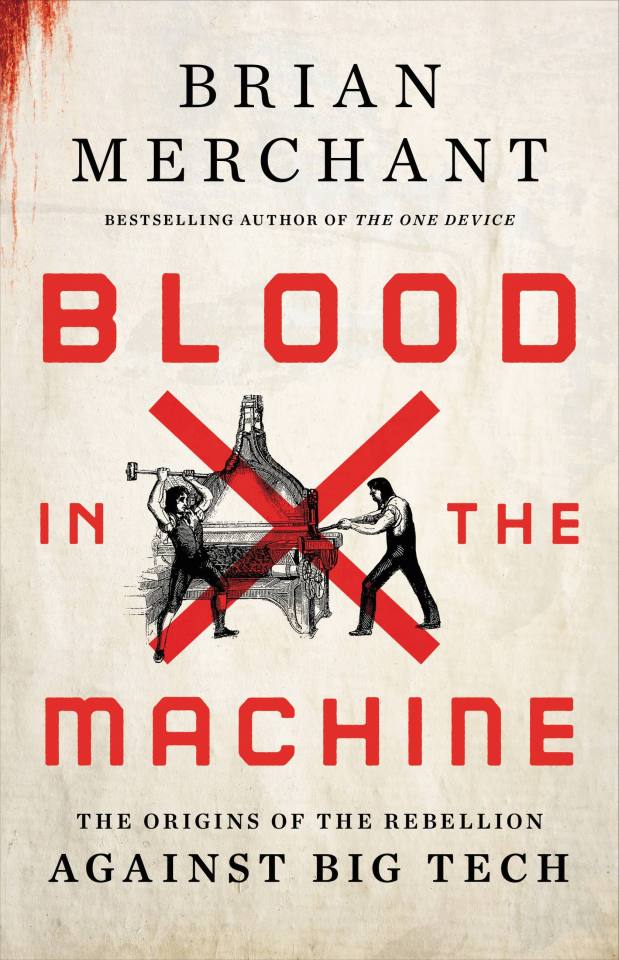
Tomorrow (September 27), I'll be at Chevalier's Books in Los Angeles with Brian Merchant for a joint launch for my new book The Internet Con and his new book, Blood in the Machine. On October 2, I'll be in Boise to host an event with VE Schwab.

In Blood In the Machine, Brian Merchant delivers the definitive history of the Luddites, and the clearest analysis of the automator's playbook, where "entrepreneurs'" lawless extraction from workers is called "innovation" and "inevitable":
https://www.littlebrown.com/titles/brian-merchant/blood-in-the-machine/9780316487740/
History is written by the winners, and so you probably think of the Luddites as brainless, terrified, thick-fingered vandals who smashed machines and burned factories because they didn't understand them. Today, "Luddite" is a slur that means "technophobe" – but that's neither fair, nor accurate.
Luddism has been steadily creeping into pro-labor technological criticism, as workers and technology critics reclaim the term and its history, which is a rich and powerful tale of greed versus solidarity, slavery versus freedom.
The true tale of the Luddites starts with workers demanding that the laws be upheld. When factory owners began to buy automation systems for textile production, they did so in violation of laws that required collaboration with existing craft guilds – laws designed to ensure that automation was phased in gradually, with accommodations for displaced workers. These laws also protected the public, with the guilds evaluating the quality of cloth produced on the machine, acting as a proxy for buyers who might otherwise be tricked into buying inferior goods.
Factory owners flouted these laws. Though the machines made cloth that was less durable and of inferior weave, they sold it to consumers as though it were as good as the guild-made textiles. Factory owners made quiet deals with orphanages to send them very young children who were enslaved to work in their factories, where they were routinely maimed and killed by the new machines. Children who balked at the long hours or attempted escape were viciously beaten (the memoir of one former child slave became a bestseller and inspired Oliver Twist).
The craft guilds begged Parliament to act. They sent delegations, wrote petitions, even got Members of Parliament to draft legislation ordering enforcement of existing laws. Instead, Parliament passed laws criminalizing labor organizing.
The stakes were high. Economic malaise and war had driven up the price of life's essentials. Workers displaced by illegal machines faced starvation – as did their children. Communities were shattered. Workers who had apprenticed for years found themselves graduating into a market that had no jobs for them.
This is the context in which the Luddite uprisings began. Secret cells of workers, working with discipline and tight organization, warned factory owners to uphold the law. They sent letters and posted handbills in which they styled themselves as the army of "King Ludd" or "General Ludd" – Ned Ludd being a mythical figure who had fought back against an abusive boss.
When factory owners ignored these warnings, the Luddites smashed their machines, breaking into factories or intercepting machines en route from the blacksmith shops where they'd been created. They won key victories, with many factory owners backing off from automation plans, but the owners were deep-pocketed and determined.
The ruling Tories had no sympathy for the workers and no interest in upholding the law or punishing the factory owners for violating it. Instead, they dispatched troops to the factory towns, escalating the use of force until England's industrial centers were occupied by literal armies of soldiers. Soldiers who balked at turning their guns on Luddites were publicly flogged to death.
I got very interested in the Luddites in late 2021, when it became clear that everything I thought I knew about the Luddites was wrong. The Luddites weren't anti-technology – rather, they were doing the same thing a science fiction writer does: asking not just what a new technology does, but also who it does it for and who it does it to:
https://locusmag.com/2022/01/cory-doctorow-science-fiction-is-a-luddite-literature/
Unsurprisingly, ever since I started publishing on this subject, I've run into people who have no sympathy for the Luddite cause and who slide into my replies to replicate the 19th Century automation debate. One such person accused the Luddites of using "state violence" to suppress progress.
You couldn't ask for a more perfect example of how the history of the Luddites has been forgotten and replaced with a deliberately misleading account. The "state violence" of the Luddite uprising was entirely on one side. Parliament, under the lackadaisical leadership of "Mad King George," imposed the death penalty on the Luddites. It wasn't just machine-breaking that became a capital crime – "oath taking" (swearing loyalty to the Luddites) also carried the death penalties.
As the Luddites fought on against increasingly well-armed factory owners (one owner bought a cannon to use on workers who threatened his machines), they were subjected to spectacular acts of true state violence. Occupying soldiers rounded up Luddites and suspected Luddites and staged public mass executions, hanging them by the dozen, creating scores widows and fatherless children.
The sf writer Steven Brust says that the test to tell whether someone is on the right or the left is simple: ask whether property rights are more important than human rights. If the person says "property rights are human rights," they are on the right.
The state response to the Luddites crisply illustrates this distinction. The Luddites wanted an orderly and lawful transition to automation, one that brought workers along and created shared prosperity and quality goods. The craft guilds took pride in their products, and saw themselves as guardians of their industry. They were accustomed to enjoying a high degree of bargaining power and autonomy, working from small craft workshops in their homes, which allowed them to set their own work pace, eat with their families, and enjoy modest amounts of leisure.
The factory owners' cause wasn't just increased production – it was increased power. They wanted a workforce that would dance to their tune, work longer hours for less pay. They wanted unilateral control over which products they made and what corners they cut in making those products. They wanted to enrich themselves, even if that meant that thousands starved and their factory floors ran red with the blood of dismembered children.
The Luddites destroyed machines. The factory owners killed Luddites, shooting them at the factory gates, or rounding them up for mass executions. Parliament deputized owners to act as extensions of law enforcement, allowing them to drag suspected Luddites to their own private cells for questioning.
The Luddites viewed property rights as just one instrument for achieving human rights – freedom from hunger and cold – and when property rights conflicted with human rights, they didn't hesitate to smash the machines. For them, human rights trumped property rights.
Their bosses – and their bosses' modern defenders – saw the demands to uphold the laws on automation as demands to bring "state violence" to bear on the wholly private matter of how a rich man should organize his business. On the other hand, literal killing – both on the factory floor and at the gallows – was not "state violence" but rather, a defense of the most important of all the human rights: the rights of property owners.
19th century textile factories were the original Big Tech, and the rhetoric of the factory owners echoes down the ages. When tech barons like Peter Thiel say that "freedom is incompatible with democracy," he means that letting people who work for a living vote will eventually lead to limitations on people who own things for a living, like him.
Then, as now, resistance to Big Tech enjoyed widespread support. The Luddites couldn't have organized in their thousands if their neighbors didn't have their backs. Shelley and Byron wrote widely reproduced paeans to worker uprisings (Byron also defended the Luddites in the House of Lords). The Brontes wrote Luddite novels. Mary Shelley's Frankenstein was a Luddite novel, in which the monster was a sensitive, intelligent creature who merely demanded a say in the technology that created him.
The erasure of the true history of the Luddites was a deliberate act. Despite the popular and elite support the Luddites enjoyed, the owners and their allies in Parliament were able to crush the uprising, using mass murder and imprisonment to force workers to accept immiseration.
The entire supply chain of the textile revolution was soaked in blood. Merchant devotes multiple chapters to the lives of African slaves in America who produced the cotton that the machines in England wove into cloth. Then – as now – automation served to obscure the violence latent in production of finished goods.
But, as Merchant writes, the Luddites didn't lose outright. Historians who study the uprisings record that the places where the Luddites fought most fiercely were the places where automation came most slowly and workers enjoyed the longest shared prosperity.
The motto of Magpie Killjoy's seminal Steampunk Magazine was: "Love the machine, hate the factory." The workers of the Luddite uprising were skilled technologists themselves.
They performed highly technical tasks to produce extremely high-quality goods. They served in craft workshops and controlled their own time.
The factory increased production, but at the cost of autonomy. Factories and their progeny, like assembly lines, made it possible to make more goods (even goods that eventually rose the quality of the craft goods they replaced), but at the cost of human autonomy. Taylorism and other efficiency cults ended up scripting the motions of workers down to the fingertips, and workers were and are subject to increasing surveillance and discipline from their bosses if they deviate. Take too many pee breaks at the Amazon warehouse and you will be marked down for "time off-task."
Steampunk is a dream of craft production at factory scale: in steampunk fantasies, the worker is a solitary genius who can produce high-tech finished goods in their own laboratory. Steampunk has no "dark, satanic mills," no blood in the factory. It's no coincidence that steampunk gained popularity at the same time as the maker movement, in which individual workers use form digital communities. Makers networked together to provide advice and support in craft projects that turn out the kind of technologically sophisticated goods that we associate with vast, heavily-capitalized assembly lines.
But workers are losing autonomy, not gaining it. The steampunk dream is of a world where we get the benefits of factory production with the life of a craft producer. The gig economy has delivered its opposite: craft workers – Uber drivers, casualized doctors and dog-walkers – who are as surveilled and controlled as factory workers.
Gig workers are dispatched by apps, their faces closely studied by cameras for unauthorized eye-movements, their pay changed from moment to moment by an algorithm that docks them for any infraction. They are "reverse centaurs": workers fused to machines where the machine provides the intelligence and the human does its bidding:
https://pluralistic.net/2021/02/17/reverse-centaur/#reverse-centaur
Craft workers in home workshops are told that they're their own bosses, but in reality they are constantly monitored by bossware that watches out of their computers' cameras and listens through its mic. They have to pay for the privilege of working for their bosses, and pay to quit. If their children make so much as a peep, they can lose their jobs. They don't work from home – they live at work:
https://pluralistic.net/2021/01/22/paperback-writer/#toothless
Merchant is a master storyteller and a dedicated researcher. The story he weaves in Blood In the Machine is as gripping as any Propublica deep-dive into the miserable working conditions of today's gig economy. Drawing on primary sources and scholarship, Blood is a kind of Nomadland for Luddites.
Today, Merchant is the technology critic for the LA Times. The final chapters of Blood brings the Luddites into the present day, finding parallels in the labor organizing of the Amazon warehouse workers led by Chris Smalls. The liberal reformers who offered patronizing support to the Luddites – but didn't imagine that they could be masters of their own destiny – are echoed in the rhetoric of Andrew Yang.
And of course, the factory owners' rhetoric is easily transposed to the modern tech baron. Then, as now, we're told that all automation is "progress," that regulatory evasion (Uber's unlicensed taxis, Airbnb's unlicensed hotel rooms, Ring's unregulated surveillance, Tesla's unregulated autopilot) is "innovation." Most of all, we're told that every one of these innovations must exist, that there is no way to stop it, because technology is an autonomous force that is independent of human agency. "There is no alternative" – the rallying cry of Margaret Thatcher – has become our inevitablist catechism.
Squeezing the workers' wages conditions and weakening workers' bargaining power isn't "innovation." It's an old, old story, as old as the factory owners who replaced skilled workers with terrified orphans, sending out for more when a child fell into a machine. Then, as now, this was called "job creation."
Then, as now, there was no way to progress as a worker: no matter how skilled and diligent an Uber driver is, they can't buy their medallion and truly become their own boss, getting a say in their working conditions. They certainly can't hope to rise from a blue-collar job on the streets to a white-collar job in the Uber offices.
Then, as now, a worker was hired by the day, not by the year, and might find themselves with no work the next day, depending on the whim of a factory owner or an algorithm.
As Merchant writes: robots aren't coming for your job; bosses are. The dream of a "dark factory," a "fully automated" Tesla production line, is the dream of a boss who doesn't have to answer to workers, who can press a button and manifest their will, without negotiating with mere workers. The point isn't just to reduce the wage-bill for a finished good – it's to reduce the "friction" of having to care about others and take their needs into account.
Luddites are not – and have never been – anti-technology. Rather, they are pro-human, and see production as a means to an end: broadly shared prosperity. The automation project says it's about replacing humans with machines, but over and over again – in machine learning, in "contactless" delivery, in on-demand workforces – the goal is to turn humans into machines.
There is blood in the machine, Merchant tells us, whether its humans being torn apart by a machine, or humans being transformed into machines.
Brian and I are having a joint book-launch tomorrow night (Sept 27) at Chevalier's Books in Los Angeles for my new book The Internet Con and his new book, Blood in the Machine:
https://www.eventbrite.com/e/the-internet-con-by-cory-doctorow-blood-in-the-machine-by-brian-merchant-tickets-696349940417

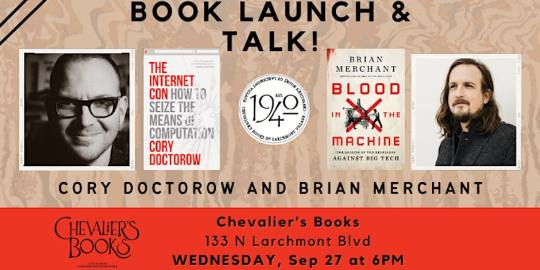

If you'd like an essay-formatted version of this post to read or share, here's a link to it on pluralistic.net, my surveillance-free, ad-free, tracker-free blog:
https://pluralistic.net/2023/09/26/enochs-hammer/#thats-fronkonsteen
#pluralistic#books#reviews#brian merchant#luddism#automation#history#gift guide#steampunk#makers#tina#inevitablism#reverse centaurs#amazon#arise
547 notes
·
View notes
Text

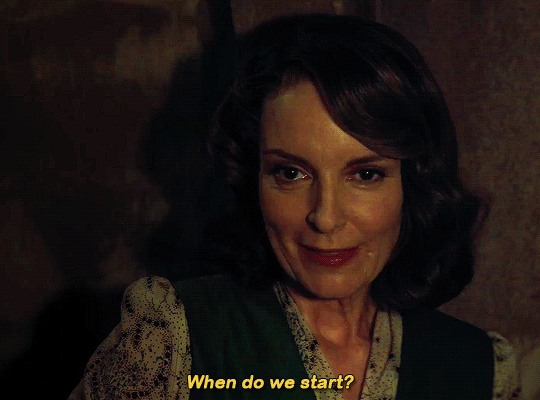
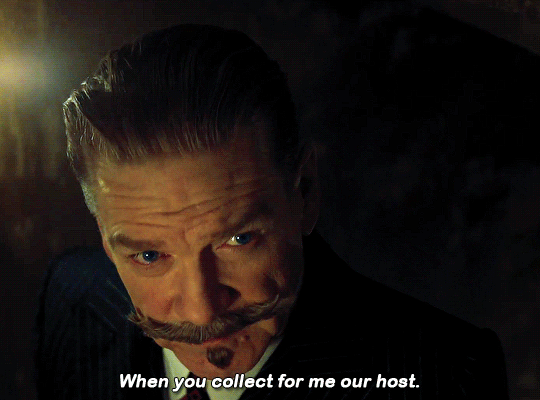



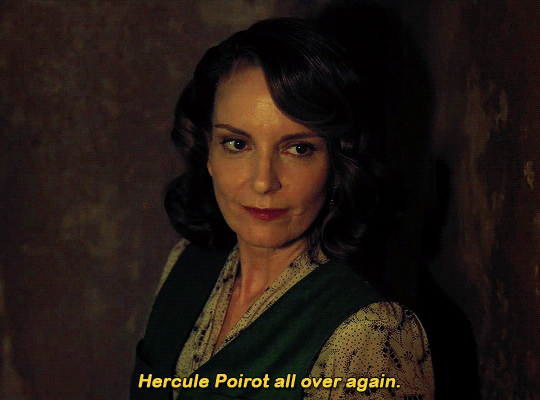
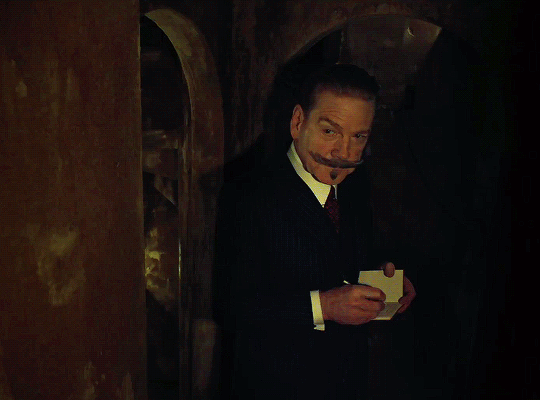
A Haunting in Venice (2023), dir. Kenneth Branagh
Poirot had been wondering, while eating his dinner, what it was that was driving Mrs. Oliver to visit him, and why she was so doubtful about what she was doing. Was she bringing him some difficult problem, or was she acquanting him with a crime? As Poirot knew well, it could be anything with Mrs. Oliver. The most commonplace things or the most extraordinary things. They were, as you might say, all alike to her. She was worried, he thought. Ah well, Hercule Poirot thought to himself, he could deal with Mrs. Oliver. He always had been able to deal with Mrs. Oliver. On occasion she maddened him. At the same time he was really very much attached to her. They had shared many experiences and experiments together.
- Agatha Christie, Elephants Can Remember
#a haunting in venice#poirot#hercule poirot#agatha christie#kenneth branagh#tina fey#perioddramaedit#filmedit#ahauntinginveniceedit#*edit#from the exclusive clip by PEOPLE#love how obvious it is she cares about him#she's indeed been worried for him#he's described as 'lonely' and 'grieving' in the film#per the reviews#he really needs someone to be by his side#she brings him out of his shell#in another clip he tells ariadne oliver#it's good to have a friend#i think she's exactly the kind of friend he needs <3
180 notes
·
View notes
Text
As painful as it is to imagine Esen joining the ghosts that follow Ouyang, I really don't think he does.
Ghosts in SWBTS are described as hugry, restless and born of resentment, but Esen accepted his death! He didn't understand Ouyang enough to know this was coming, but his death was inevitable from the very beginning of the story and Esen only understood that when Ouyang had already staged a coup against him. It doesn't matter that they loved each other, it doesn't matter that Ouyang will spend the rest of his life haunted by his choices, Esen needed to die for Ouyang to be free and complete his revenge. If Esen didn't accept his fate, why would he just let himself be killed?
#in other words. that book messed me up a little.#swbts#she who became the sun#shelley parker chan#tina rambles#he who drowned the world#(can august just come already the early reviews made me so impatient)#i NEED to see zhu get worse <3#& ouyang haunted and grieving and tortured by choices he made#they both deserve it#the radiant emperor#the radiant emperor series
83 notes
·
View notes
Text
1.06 - ceres
the one second lead in: the music, the handwashing, the VOICE, and then it’s him! jon bernthal!!! jon bernthal is mikey

and the moment you realize he’s mikey, it makes you hit your head. because you saw the back of his head for a second and who else could it be? you heard him speak to carmy in carmy’s head and who else sounds like that? every rewatch you will see him and hear him before this episode and think to yourself: “how the FUCK did i not know it was him the moment we got that glimpse of him?”
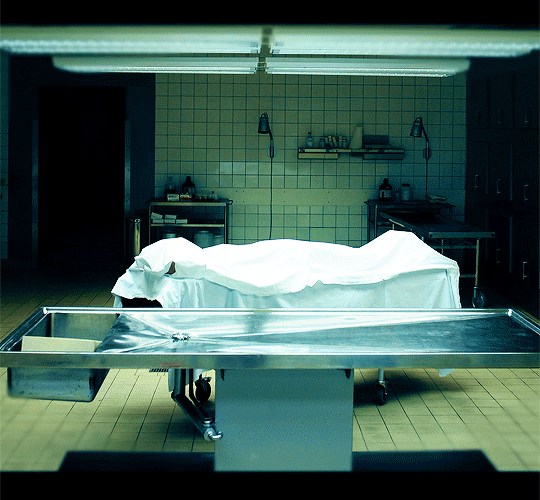
i love that mikey is wearing a beef shirt, just like richie does in the present day
i love the charisma of this story. that mikey can talk about being drunk and high at 6:45am with richie and we the audience are just like “hell yeah, what a night!” and how in the flash forward and in future episodes we see the immediate narration from the creative team behind the scenes telling us: no, no, no. this is BAD
this is the most chicago story of all time. ceres bar, savvy, bill murrey, blackhawks. just pure chicago
i love that the quick mention that richie went behind the bar to grab a informational pamphlet about ceres, the goddess of agriculture, and about ceres the bar, and how it will come back to play in the episode when richie talks to syd
fun fact: in the restaurant where present day richie is on a date; the kitchen of that (real chicagoan) restaurant is where they filmed carmy’s new york kitchen flashback in episode two. it’s funny that the kitchen was played off as new york, but the dining room was set in chicago where it actually is
the quick snap to the present to listen to richie/no-charisma richie/lost-without-his-best-friend-richie is so good. because mikey is so engaging that we totally forgive and forget the element of the story where he was drunk and high at 6:45 in the morning at a bar. but when richie tells the story it’s deeply sad and we realize it’s sad. and it makes me wonder how much of mikey’s problems weren’t dealt with because he was charismatic? how many people thought he was totally fine until he died, and then looked at the people around him and saw how sad they were and realized how sad mikey must have been?
i saw a really funny post online where someone was saying they thought richie must have been skimming off the top of the bear because he was wearing a $6,000 suit that was perfectly tailored to him. which is hilarious to me, because this is a tv show. carmy is wearing a $60-$120 t-shirt. A T-SHIRT! we’re being told that both of these guys are broke-ish, operating a broke sandwich shop. they’re not stealing from the shop, they’re characters on a tv show. i love the idea of richie skimming from the top, but as we see more and more as the show goes on, richie is committed and wouldn’t do that
that song that plays as we come into the beef. i’m blanking on the name, but it also played in ferris bueller’s day off, which is also set in chicago. i’m just assuming it’s a “chicago song”? i like it though
richie twisting his poor date as HER fault as he recounts it to tina. so real. i’ve talked to a lot of richie’s who go on a lotta dates and when they tell me about it afterwards it’s always THEIR DATES fault, and never their own. “no sense of humor, no sense of chicago history”. not, “we’re in our 40’s and i’m trying to entertain and impress her with a bill murrey story about being high and drunk at a bar at 6:45am”
“OK LISTEN UP! okay, i just yelled like that?” “yeah, make it worth it” THATS HOW YOU RUN A FUCKING KITCHEN! like, i know carmy gets so much shit for how he runs the kitchen, and i’m not trying to excuse his NUMEROUS faults. like with his mental health, how he expresses his feelings in a professional setting, and his obvious shortcomings with managing a shop. BUT a dishwasher felt empowered to make an announcement to the whole shop about taking tape off of bins they toss in the sink, and i love it. it’s the little details that show that carmy IS actually a good, caring, empowering boss who probably deserves to be the boss. he just also has his struggles, which is why he needs sydney. which is kinda the point of the show? or at least one of the points
ok. i know that i complain about syd a lot; WHICH I DONT WANT TO, because syd is the best. BUT i think it’s overlooked that the show does try to balance syd and carmy. neither are perfect. and it shows here where syd is diving into a conversation about her new dish, and carmy REPEATEDLY tells her “now is not a good time, can we do this later”, but she barrels on ahead. now, can we assume that she’s probably tried to talk with him more than just this once? sure. but how do you expect to get carmy’s OK if he’s saying “not right now” and you insist “now”? i really like how this show gives both carmy and sydney faults. i like that syd is as excited and peppy as carmy is hesitant and a bit cynical. it’s very: elder service industry vs. new service industry. when i started out i was very syd, and by the time i left i was very carmy
another mention of the story arch for risotto, and the to-go! now they’re lumped together. risotto to go (which is fun to say) AND also, is kinda weird and hard to do. risotto is a sticky mess and if it’s anything less than perfect is barely worth eating and to-go’s thrive on food that is worth eating when it’s less than perfect. because it’s been sitting in a box for 10min - 1 hour. 15 minutes in and risotto is crap
the fact that carmy says: “i’m thinking about it. have you thought about the work flow? have you talked to manny and angel (about dishes)?” and when syd says “yes” he says “okay. now you know where i’m coming from. we have just gotten this place to a kinda functioning, chill place. i’d like to keep it that way for just a bit.” shows a good amount of managerial insight. like, i love syd for wanting to jump into these ideas and work towards creating the restaurant she dreams of with carmy. but the hardened realism from carmy of “this is a journey, and there are a lot of working parts, and a lot of those working parts are human beings who we need to make sure are onboard with coming in this journey with us. so we can’t just forge ahead and have them dragging their feet behind us”
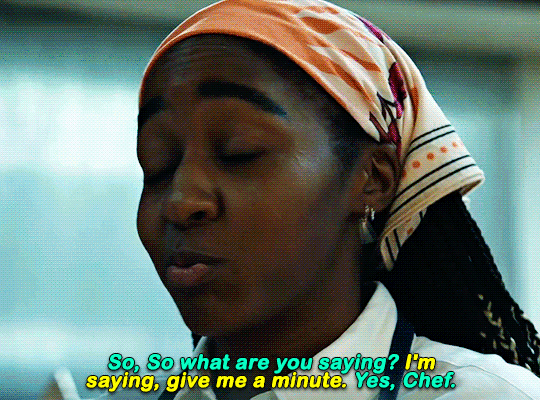
of course, that good moment of managing then follows right into carmy not knowing how to work with the irs with the beefs taxes. which is so fitting. carmy is good with food, and (in my opinion) respecting people who aren’t pretentious. he’s not good at business. but nat is (…foreshadowing!!!!!)
carmy and cat saying “you’re yikes” to richie is so on point. and richie hopping into their sibling chat, like he thinks he belongs (because he does think he belongs in family talks) is also on point.

“i know exactly where it is” SMASH CUT to nat and carm in the office NOT FINDING IT. this is comedy gold. rough, gritty, painful, amazing, comedy gold
it’s interesting that in a scene where we focus on the end of it, the beginning of it we see richie burst out the door and sigh looking like he’s absolutely exhausted and the ONLY thing that can save him is a cigarette. thats when he looks over and sees the bar closed. but why would he be exhausted? we know the place hasn’t opened yet. we also know he doesn’t do anything except man the register (and “manage”, whatever he thinks that means for himself). so his job hasn’t really started yet, but he’s exhausted already??? we know he suffers from dread (from episode four) and takes xanax. i wonder if he was having a panic attack come on and a quick smoke was going to help soothe the nerves. not that i know from experience or anything….
if you think marcus sleeping on the floor of the kitchen isn’t something that has happened at your favorite restaurant…HAHA, so sorry to disappoint you. for a million reasons it happens. sometimes there are people so obsessed with getting something that they stay late and don’t want to go home just to come back, sometimes they are homeless (either short or long term) and it’s all they got. but it has probably happened at your favorite restaurant. sorry if that bothers you
i like the back and forth between syd and richie here. syd is reaching out in a generally nice and friendly manner, and richie responds mostly in kind. but richie’s somewhat hypocritical response of being sad the bar is closing, because it is another spot that he see’s as “his” that is closing. even if he was pseudo-banned from the bar. it wasn’t the bar he went to, but it was in HIS neighborhood. that makes it HIS community. like family. you don’t have to see eye to eye, to appreciate them in your life and be sad when something bad happens to them

but it’s also nice to hear syd’s side of things: these older (maybe dingier) places are shutting down and being replaced by “nicer” spots, because in her mind the people of the neighborhood deserve nice drinks and food
i love the sorta surface level debate about gentrification this show brings up. because richie likes what the river north neighborhood had to offer: the beef. the bar next door. these familiar places for working class, everyday people. sydney likes that nicer/trendier places are coming in because that’s gotta be “good for the community” as everyone says when something like that goes into a “rougher” neighborhood. i remember like 15 years ago gentrification was a GOOD THING in so many (white, conservative and neo-liberal) circles. a “good restaurant” was going to bring jobs, class, and clientele from outside the neighborhood to come into the neighborhood and spend their money, and then there will be more money for this neighborhood. of course, most of the people in those neighborhoods learned that as time went on, more “nice” places moved in, and they brought in more “nice” people from outside neighborhoods, and suddenly real estate prices went up, and suddenly rent went up, and suddenly those “nice” people from out of the neighborhood started moving in, and suddenly the businesses and the people who had been in that neighborhood for generations were getting squeezed out. i know richie is concerned about gentrification (even if that word is never used) out of his own selfish purposes, and his own fears of himself being squeezed out as the beef gets better. but i don’t think he’s fully wrong in what he’s saying. the owner of that bar lost his business, people who worked there lost their jobs. a sweet green is going in across the street. the river north he was raised in is disappearing, and without the love and anchoring of his best friend, he might disappear too.
in this talk between richie and sydney, we see richie pull out his knowledge of cerses again! he clearly read that pamphlet deeply. and also he must have identified with cerses a lot if he has retained all this info. but again, richie isn’t dumb, he loves phillip k. dick. he reads. he might be bad at stories, and explaining his analogies properly, but he’s not dumb. i love the poorly spoken idea of richie talking about the ceres statue not having a face, because when it was built it was the tallest building in chicago, no one could see it, so why would it need a face if no one could see its face? but then as time went on buildings rose up higher than the statue and now everyone could see it has no face. we know richie feels connected to ceres (his voicemail is bill murrey saying that they’ve reached “the goddess of agriculture”). he’s the statue with no face. he used to feel like he was on top of chicago, but now everyone is rising up past him, the beef is getting updated with a classically trained menu, and they can see that he has no face. which actually says more about him, than the others around him. he says they’re ruining things by making “bigger buildings”/changing the beef/improving the beef. but he’s actually scared that they’re going to improve to a place where everyone can see that he actually “has no face”/he’s not as good or important as he says he is. they’re going to grow up around him, and not need him anymore. he sees it as ruining a perfectly good statue, but really he’s reacting out of fear
i love that his talk about gentrification and the neighborhood changing too much is then interrupted by a bullet going through the window. the neighborhood isn’t changing too much
plus, his first move is to talk to the mobsters that hang out next door about if they knew anything…the neighborhood still has some ways to go
i also love that these gangsters are also soprano stereotypes, but it’s also spot on for a lot of italian mobsters in chicago
we see a little inking of who richie is, and his real role at the beef and his skill set with his talk with crooked john. he talks to him without fear, with an obvious previous relationship, and they share a conversation with respect. richie knows they exist and in his eyes they’re a part of his community, his little family, and as such they also deserve his respect. and after their talk, richie asks him if he could find anything out about who shot the window, and crooked john immediately gets guys to go and check it out. this is richie being the tallest point in chicago; this world is being squeezed out, but for a long time this was him being top dog of his world. but now the sweet greens are moving in, the buildings are growing in taller than him
also, i LOVE that crooked john says “alright, don’t go calling the police.” and richie says “what do you take me for? this is me we’re talking about.” ACAB, we love it. no police! (okay, it’s not strictly ACAB, but it IS a wide belief of working class people that cops aren’t going to do shit for you if you’re not rich enough. you gotta look out for yourself, and your community). this is what neighborhood watches were made to be, until white upper-middle class suburbanites made them into gossipy-call-the-cops-on-people-of-color-just-out-walking-their-dogs-at-night kind of things. so many studies show that neighbor and community solidarity actually does a better job at keeping the community safe and people cared for than any amount of money invested into police presence. just sayin’
sugar, in this moment, is SUCH a upper middle class individual. we’ve seen her nice house. we know she’s not living in the area anymore. she had an urban flight. she’s so upset that she owns a spot where bullets can fly through the window. and, yes, in this moment we’re supposed to focus on the fact that carmy is pushing for everyone to keep working so that they can open on time and not lose business. it’s more about carmy’s denial of feelings and always working and pushing so he doesn’t have to deal with his own issues. BUT notice how everyone is working together without qualm. for them, this is a part of life. and yes, not a good part. but if they don’t open, the shop probably closes and they lose their jobs. when nat asks to call the cops, in unison they all say “no cops” (ACAB ACAB) why? because cops aren’t going to help, and they know. some of them might be illegal immigrants. and again, if you think illegal immigrants aren’t in your favorite restaurant, or even cooking you your favorite meal…sorry for the rude awakening. everyone in the restaurant is dealing with the issue themselves, as they always have, because they live in a place where cops don’t come to help, but only cause more problems. nat, who lives in a more residential area, most likely a suburb outside chicago (from the looks of her house), and her whiteness and blonde hair, means she’s probably more used to the cops helping her. this show is about class and race, and anyone who says otherwise is wrong
a rare moment of harmony between carmy and richie. “paperwork’s not really my jam” “me neither”. they didn’t teach paperwork at noma, nor at devry. we have this sweet moment that shows richie and carmy’s long history together, and the fact that they’re cut from the same cloth. they even share a cigarette
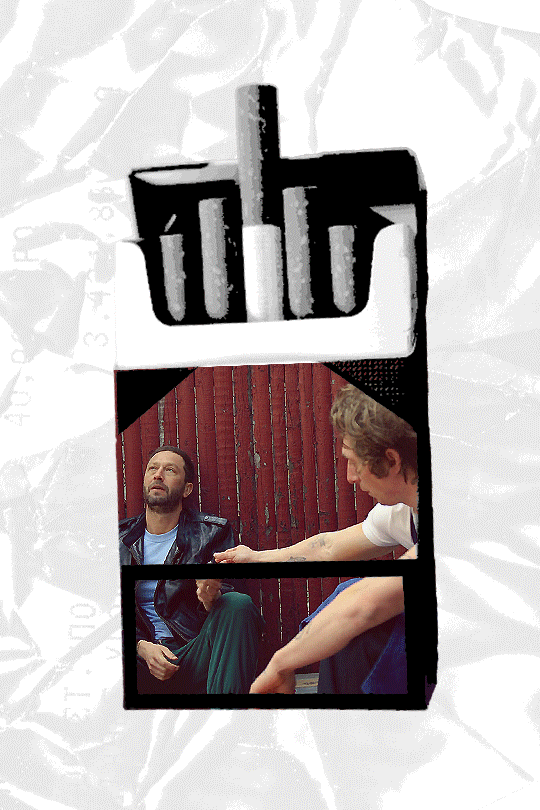
“is there a name for that feeling where you’re scared of something good happening because you think something bad is going to happen?” “i don’t know. life?”
richie being in his ex-wife’s phone as “richie bad news” is so harsh. i have never been divorced, but i can’t imagine trying to poison my kids image of their parent to the point where they think their dads last name is bad news. but we’re just seeing so much of richie’s life
“oh shit! it’s the man with the golden dick! how are ya tom?” is……just a wild line to say to a customer when they come into your shop. i have so many questions. why does this man have a golden dick? why are you commenting on it? what transpired between the two of you (a guy behind a register, and his customer) that you have “golden dick” as context, and you feel comfortable bringing up said golden dick? ALSO, i’d love to know if this was pre-written by the writers, or if ebon ad libbed it himself. it feels like ad lib but, if it is written, i want to meet the person who wrote it. or, even more, IF THEY PITCHED the line in a writers room. like if someone sat at a table with the rest of the writers and someone was like “what should richie say to this customer?” “what about…’oh shit, it’s the man with the golden dick’?”
BUT i LOVE that this scene shows that richie IS GOOD at his job. i feel like it’s skipped over a lot this season. but richie is personable. he’s good with people. he talks with people friendly, personably, and it’s obvious why he’s front of house
ok. syd’s dish she wants to add to the menu does look AMAZING
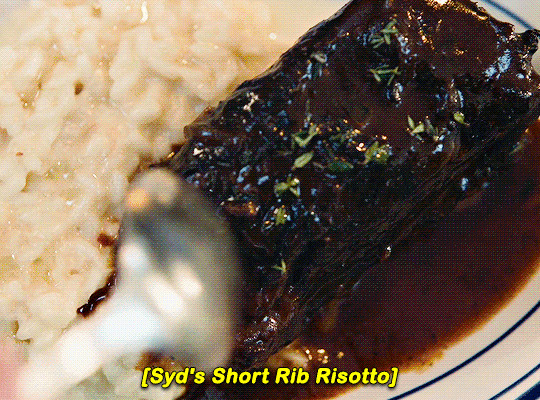
but see, syd asks carmy if now is a good time to try her dish, he says yes, and he thanks her for asking. like…before syd was rushing things and pushing. carmy owns a business, he’s looking for tax shit, he’s got a million other business things he’s working on to make sure the place doesn’t close, and he’s working the beginning of the dinner rush and overseeing the line, which means he’s keeping track of every dish and what everyone is doing to make sure it all is up to quality. so, he’s busy. telling syd he can’t do something right then isn’t a dick move, he’s BUSY. but now he can talk with her, and try her dish
WHAT I WILL SAY THOUGH, and i’ll say it now and bring it back up when it comes up in future episodes is that he doesn’t tell her what’s wrong with her dish BECAUSE HE DOESNT KNOW. and he has to be the best chef, and not knowing drives him crazy and he doesn’t want to admit he’s stumped. he tells her it’s tremendous but it’s missing something, but he won’t tell her what it’s missing because he doesn’t know himself. this is a dick move. some might say he’s trying to teach her, but he has no problem pointing out other flaws in the dish that she says she’ll fix. he also has no problem correcting others to help dishes be better. but for this dish, he can’t tell her what’s wrong. not because he’s “wax on/wax off” teaching her, but because he really doesn’t know. i’ll talk about how i know that carmy doesn’t know what’s missing from the dish as the clues pop up (but that will be in a different episode). but this is a dick move on carmy’s part. a real golden dick move.

i’ve seen people say they’re so confused why syd would’ve given her dish to a customer. but i’ve seen that all the time. it’s not enough for a family meal. plus it’s not time for a family meal. it’s during dinner rush. so she can either toss it, or give it away. and giving it away makes that customers day. i’ve both given stuff away, and received stuff. and it did make my day. the fact that he happens to be an “immensely important customer” (that we’ll learn about next episode) is just a bit of tv happenstance
i just realized with this watch through that nat says it pisses her off that carmy never asks her how she’s doing. and that made me think about the flashback episode in season two. we’ll talk more when we get there, but it’s interesting that nat always asks her mom if she’s okay. and she’s mad at carm for not asking her.
i love the duality of where nat and carmy place their blame. nat blames the restaurant for their mom, for mikey, and now for carmy. and she’s scared the restaurant is going to do the same thing to carmy that it did to mikey. carmy blames their mom and mikey for their own faults and sees the restaurant as a neutral place that happened to take the brunt of their faults. it’s also telling that carmy’s happiest memories with mikey are when they’re cooking, and he found cooking to be an escape from his traumatic and toxic family. but nat seems to not find cooking an escape and does it occasionally and for family care, and nothing else
i love the slow opening up of carmy. he admits he feels trapped and that he doesn’t want to ask how others are feeling because he doesn’t know how he feels. it’s just that little bit closer on carmy’s journey to personal mental and emotional health

i also think it’s symbolic that as the restaurant is failing, and carmy and nat are fighting over the restaurant but also fighting over their relationship and what the restaurant represents for their family, their own wellbeing, and how carmy’s attempts to save the restaurant are slowly killing him and leading him down a path that nat fears will repeat mikey’s mistakes, it’s only after carmy and nat have a heart to heart and share their feelings that carmy (as the one who finally opened up) found the tax documents that they needed to give to the irs to save the shop. because it’s only through mental and emotional health that the shop is going to be saved. like nat was saying: less chaos, solid footing
the repeat of the lowboy checks, and it’s nice to see them look perfectly adequate. i mean….we’re dealing with lowboys, it’s not like i’m going to be blown away by good food storage
i’m not sure if i’ve mentioned this in these live bloggings before. but i’ve been to chicago a few times, and i’ve seen a few fights break out on more than one trip. so, the fact that two gangs begin to fight outside of an italian beef sandwich shop…….that tracks for me? i’m not saying it’s a specifically chicago thing, i’ve seen other fights break out in other places (i once went to a bar twice, and each time a fight broke out) but like…this doesn’t feel like tv happenstance to me. it kinda feels like a chicago scene to see two rival old school gangs fight
“WHERES MY GUN, ANY OF YOU MOTHERFUCKERS TAKE MY GUN???” ohhhhhhh richie
the fact that syd, a tiny tiny human being shoves herself between to tall and large men, who are clearly mob connected, is WILD. she’s a better person than i am. but whatta great save: pop and sandwiches for everyone if they just calm down. but keep it on the DL. i love sweeps asking these people to betray their gangs rivalries for food and they’re like “eh. ok.”
i also love the slow undercurrent of sweeps’ backstory. sweeps tells marcus that when he used to play for the cubs he had to sleep in a few creative places. crooked john asks him about the changes and sweeps says “this is what happens when you sweep the padres but fail the drug test”. i love it
it’s wild to me that not being able to get into a fight between the two arguing gangs is what sets richie off. we know he’s having a bad day. he’s missing his best friend especially bad, he’s reminded that his daughter thinks his last name is bad news because his ex-wife has his name in her phone as richie bad news because she says he always calls with bad news. he feels like the ceres statue being passed up by every new building being built. but like…..the fact that he couldn’t be the mediator between two warring factions of mobsters is wild. it’s wild.

i love that the scene of richie flying off the handle; of lashing out by telling a loud raucous story that disrupts everyone’s routine, their system, (the new system), is kicked off by ebra dunking his hands into ice water to handle a bunch of hot meat on a grill. that method is OLD SCHOOL, maybe old school like richie is old school. the kind of old school that thinks yelling and laughing and slapping people on the back is okay during a dinner rush
it’s also so good that this is how richie lashes out. he has the cigarettes in his hand, even though just a few weeks ago he took the blame for leaving cigarettes out during a health inspection. he’s interrupting the workflow, even though we’ve repeatedly seen carmy yell at him about getting back to work and letting everyone get into their zone. he’s lashing out like this intentionally. and his outburst at sydney makes sense because she’s the biggest threat to him. carmy is family, his “cousin”, in his community. even as carmy is threatening to build taller towers that surpass richie, it’s more okay because carmy is in the family. but sydney isn’t. richie doesn’t know sydney, or care about her past. they didn’t grow up together. she’s an outsider, and so when she yells at him to get back to work, it allows him to freak out at her. she symbolizes everything he’s scared of, and she’s the one who solved the gangsters, the last bit of usefulness he thought he had
and it’s also so good and powerful that it’s tina that talks to him. tina is the one who was with richie the most. she was the most resistant to the new system. she laughed when things failed, she was making things harder for syd. but now she’s better. she’s figured it out. this new system is better. she’s more efficient, she’s cooking better food. she works at a place she believes in, and she believes in herself for the first time in a long time, if not for the first time ever
so tina telling richie he needs to go home, and cool off, and if he quits where else is he gonna go is simply so powerful and good. because that’s kind of the point, and richie doesn’t realize it. most people in that shop have nowhere else to go. maybe they’d find another job, but maybe they wouldn’t. they were just people working in a struggling sandwich shop and carmy (and sydney) have allowed them to believe in something more, because sydney and carmy believe in them. and richie either needs to realize that, yes, he’s ceres statue and everybody else is a taller tower, but he’s being offered a ride to the top of one of those towers if he’d just let go of his pride that he used to be the tallest one around. “where are you gonna go?” is so cutting. he’s got this misplaced pride and tina is saying he’s got to let it go. because if he can, someone is willing to help pick him up and take him to bigger and better things
and the fact that it’s so wrapped up in the past. tina brings up mikey “seemingly” out of the blue, but it’s because richie talks about the place being cool before. he calls syd and carm kids. because richie is a middle aged man who realized that he pissed his life away attaching himself to “the wrong person”. which also probably has guilt attached to it. he followed mikey to the gates of hell and then mikey left him there. richie is divorced, friendless, working a register at a sandwich shop, with a strained relationship with his daughter who is the only person he seems to really care about, and now these young people are coming in and changing everything and he’s scared that he’s going to get pushed out. it’s a midlife crisis to end all midlife crises. his best years are behind him (in his eyes) and he never thought about the future and now the futures here and he’s unprepared and it’s partially mikey’s fault but you can’t be mad at the dead, right? there’s so much guilt, and pain, and trauma, and everything in this convo between tina and richie, because tina gets it. but tina jumped over to another building and rode it to taller heights, and so she’s trying to get richie to do the same
AND THEN AND THEN: right after richie leaves it’s so smooth in the kitchen. and that’s the point. people are moving in and out, swapping to different stations, starting prep the moment someone finishes theirs without even waiting to look to see if they’re finished because they know they’re done. it’s a well-oiled machine, and richie not being there is truly for the better. there’s even a poppy little tune, people are smiling, it almost crosses the line into weird fantastical daydream territory, but it doesn’t
carmy asks if he wants to know what happened out there and sydney says no, just that she gave some people some leftovers. i just realized this now: is she talking about the gangsters or her dish? obviously, she’s talking about the gangsters, that’s the most immediate thing that just happened, but she also gave away her dish and that’s been the conflict between her and carly all day. is it a duel meaning? am i just high as i watch this episode? idk, you tell me
but also, carmy then apologizes to syd if he was shitty to her and she acts as if it’s no big deal. like, he’s trying. like he says in season two, he’s not trying to be shitty. idk, i just feel like people always talk about carry being angry and mad, but he really is shown trying
the poppy song and scene being cut to richie outside having called the cops (ACAB RICHIE, ACAB) on the gangsters is so good (i know i say good a lot). because specifically was insulted when crooked john said “don’t call the cops” and crooked john smiled and nodded, like “yeah, yeah. it is you. you’d never do that.” but this is like a real low point for him. he’s been talking about the delicate ecosystem, showing respect for the people in his community even if he disagrees with them (like carmy, like the bar owner, like these gangsters) and now he’s betraying his own morals, the morals of the staff at the beef, and fucking with the ecosystem he said he cared about and worried about how delicate it was. it’s showing that instead of just getting on the elevator to a taller building, he’s fighting a losing fight to hold onto his pride. syd took his pride when she handled the dangerous, scary gangsters, so he made the gangsters go away
but what’s also so good about this closing scene is that it still goes against what carmy is all about and the work he’s doing at the beef. carmy is fighting to not have the people of the beef be squeezed out with the changing of the neighborhood. he’s trying to teach people with no formal training — cooks — classically trained recipes and elevated methods to make them into chefs. but carly doesn’t want to change who they are. like he said in the third episode, he doesn’t want to change their dynamic but harness their potential. he even joins in the choir saying “no cops” when nat suggests it. carmy would never call the cops on the gangsters. case in point, he DIDN’T call the cops on the gangsters. no one did. there was this universal understanding; almost a respecting of the delicate ecosystem. and richie is the one who threatens to fuck it up by betraying everything he believes in just to hold onto his pride, and to push against carmy’s system. it’s almost like he knows mikey’s system is truly, completely dead in this moment. carmy’s system has won. and as the last holdout to join carmy’s system, and with mikey’s system destroyed, instead of moving forward richie becomes a free agent doing whatever he feels like, without a system, or a code, that he draws on. which is kinda scary if you think about it.
BUT THATS THE EPISODE
it’s so good. final thoughts: i love last episode and this one; these sort of break from the carmy show (and i love the carmy show) and allowing us to get a little deeper into the lives of the other main characters. i think it’s done even better next season (and we’ll talk about it later when it comes up)
my last thought has nothing to do with anything that happened this episode, but just something i thought of while watching the show: carmen, michael, richard. but we their nicknames are carmY, mikeY, richIE. they all have that “ee” sound. natalIE, sydneY. they also have that “ee” sound, but their nicknames are nat and syd. no “ee” sound. is there a reason the guys have “ee” nicknames (and that their nicknames are used more than their regular names) and the women have “ee” names but their nicknames don’t? is this something? or am i just high?
anywho
that’s the episode and the next one is EPISODE SEVEN and i’m not emotionally ready. see ya then!
Season One: Episode 1 | Episode 2 | Episode 3 | Episode 4 | Episode 5 | Episode 7 | Episode 8 |
Season Two
#the bear#the bear fx#the bear hulu#carmen berzatto#the bear tv#carmy berzatto#the bear liveblog#liveblog#sydney#sydney adamu#sydney the bear#marcus the bear#richie the bear#richie jerimovich#ceres#the bear season 1#the bear season 1 spoilers#tina the bear#the bear series#the bear review
30 notes
·
View notes
Text
gene and tina were such good older siblings in this episode <3 love them trying to reassure louise that santa will find their new house this christmas even when they don't believe in him anymore. sweet kids
#louise still wholeheartedly believing in santa despite everything about her personality is one of my favorite parts of christmas episodes#along w/ gene and tina supporting her insane santa-related scheming every year despite KNOWING he isnt real. like she's always starting shi#video#bob's burgers#bb spoilers#episode review
14 notes
·
View notes
Text
Posted my thoughts on Mean Girls, how you remake a film that's left an indelible mark on culture and also Gus Van Sant? For some reason? Anyway, it's up on Medium, enjoy
11 notes
·
View notes
Text
I watched the Bob's Burgers movie and it made me feel like this was the best timeline
#thats the best review i can give without spoiling anything#bobs burgers#bobs burgers movie#the bobs burgers movie#bob belcher#linda belcher#tina belcher#gene belcher#louise belcher#did it heal a part of my heart??? maybe#did it absolutely make my day? yes
279 notes
·
View notes
Text
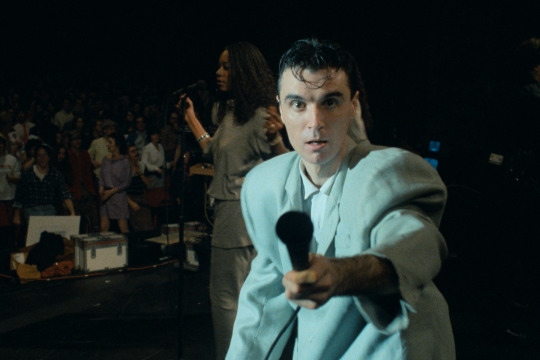
Stop Making Sense (dir. Jonathan Demme) x TIFF 2023.
Demme perfectly captures everything appealing about Talking Heads as a band and musical experience. [It's] never not completely engrossing as a rock and roll ride translated through the screen. This enhanced version only further brings the past into the future in a way that makes the music all the more propulsive. Its overall fidelity has aged and held up incredibly well thanks in part to the pioneering use of early digital audio techniques.
#stop making sense#a24#talking heads#jonathan demme#tiff#tiff 2023#movie#movies#movie review#concert#concert film#concert movie#film#film review#band#chris frantz#tina weymouth#jerry harrison#imax#documentary#music documentary#pantages theater#speaking in tongues
16 notes
·
View notes
Text
orz u can tell im actually busy at work when im not making posts abt the sheer shit we get when fitza hang out together
#qsmp lb#orz im doing yr end FS review final checks v(#:(#anyways im getting lunch soon and i found a local brazilian place thats new ish and they have feijoada and ive been wanting to try it ever#since bagi tina and etoiles had that late night food culture exchange. so#tsu talks
8 notes
·
View notes
Photo

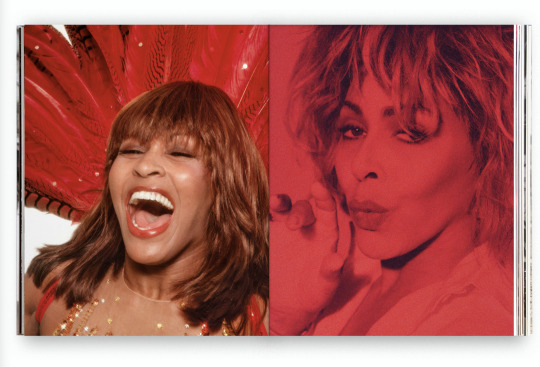

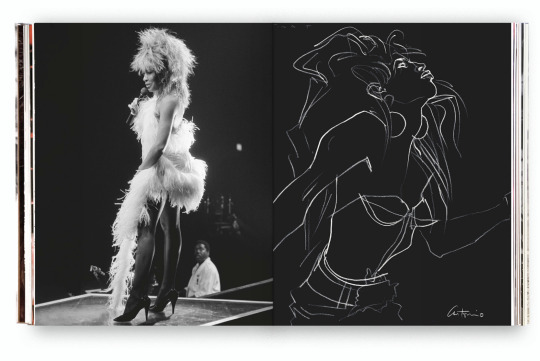


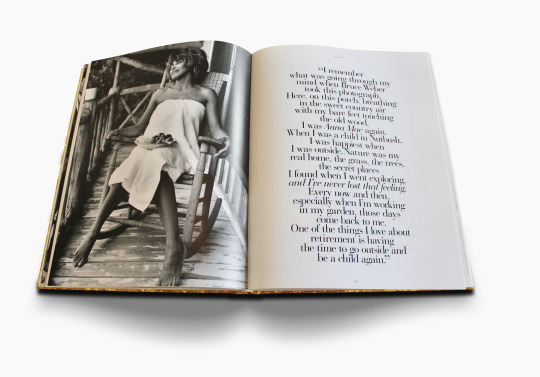
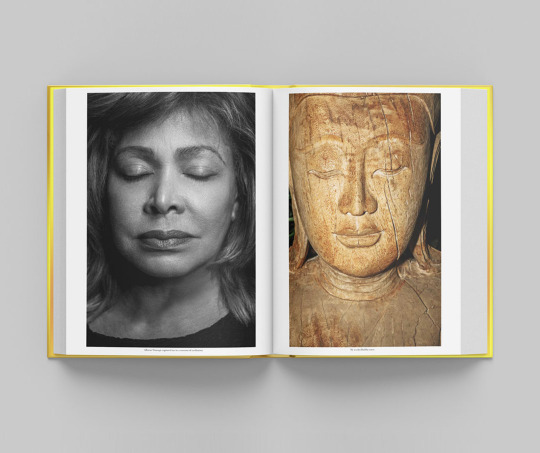
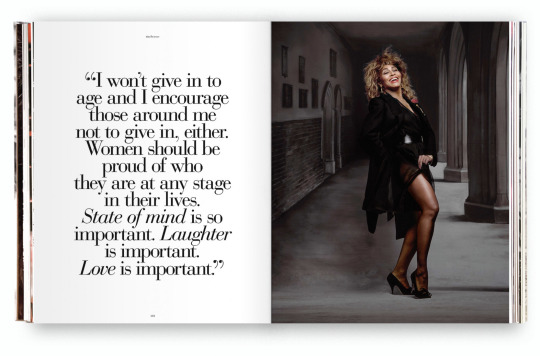

My Book Review
Tina Turner: That's My Life is a gorgeous collection of candid photos through the decades, personal letters, and an intimate look into some of the living legend's most cherished items, which includes sculptures from around the world, fashion pieces, and her gold ring. Fellow singers, friends and even Tina's daredevil moments grace these pages. But the photos of her in her home are the ones that stick out for me the most.
"I spent several years turning the house into the refuge of my dreams. My work is noisy, but my life is quiet. I need nature and solitude—they nuture me. My idea of a vacation is reading a book on the terrace while Erwin cooks us dinner."
The photo alongside those words shows Tina standing on the edge of her infinity pool with the mountains and other scenery in the distance, engulfed in fog in some areas and peering through in others. Simply serene.
I began this oversized coffee table book 2 days prior. It was only right that I finished it on November 26th. Happy 83rd Bornday to the incomparable Queen of Rock & Roll!! 💃🏽
#tina turner#tina turner that's my life#tina turner book#coffee table book#herb ritts#peter lindbergh#thechanelmuse reviews
59 notes
·
View notes
Text
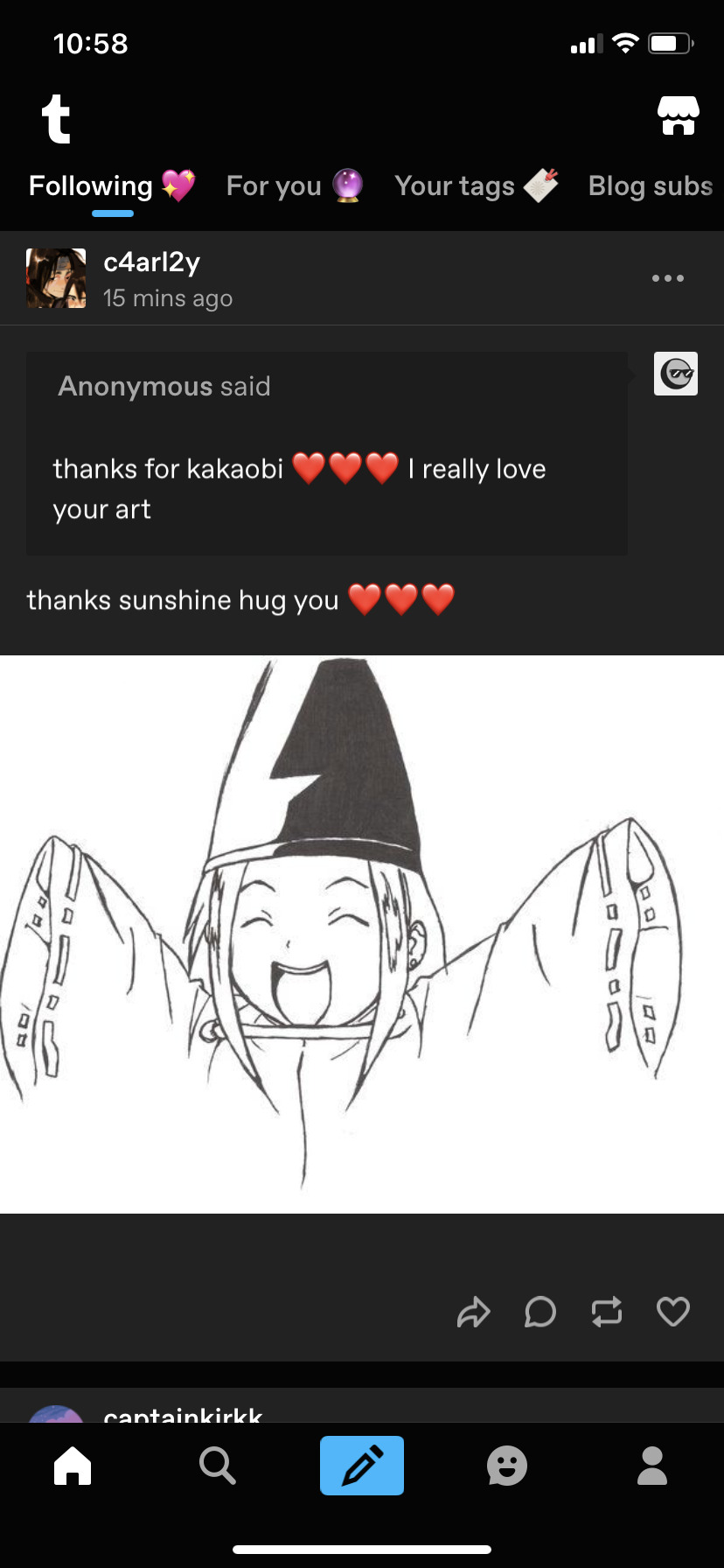
THEY SWITCHED THE PROFILE AND TUMBLRMART THINGS!!!!!!!!
15 notes
·
View notes
Text
A Haunting in Venice: 8/10
It's Branagh's best take on Christie yet, with less focus on Poirot as a person and more focus on the actual mystery itself. The actual mystery itself is slightly underwhelming and easy to solve if you're trope-savvy, but it's good spooky fun anyway.
10 notes
·
View notes
Text


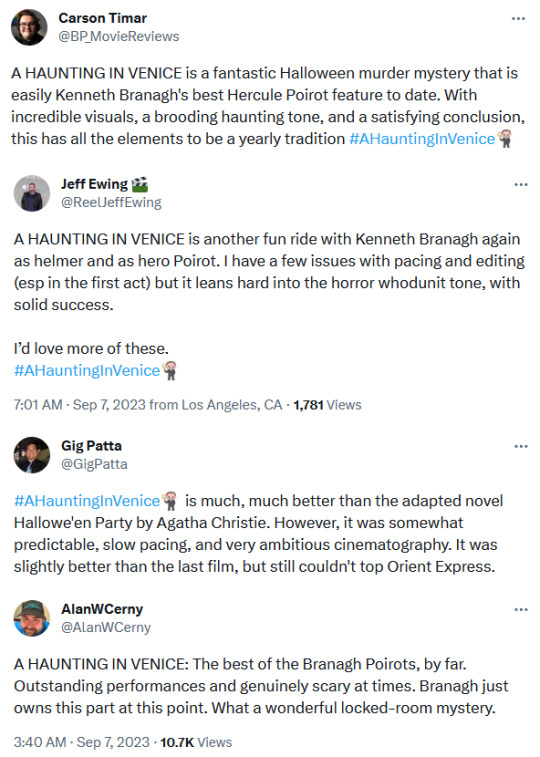

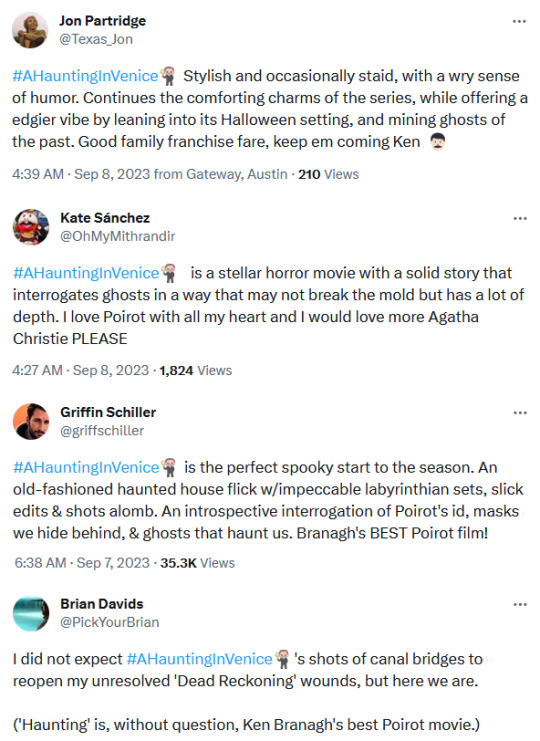

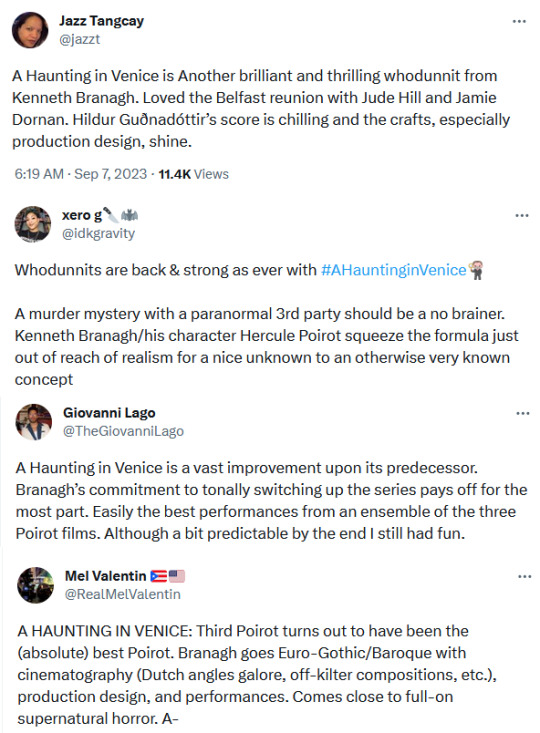

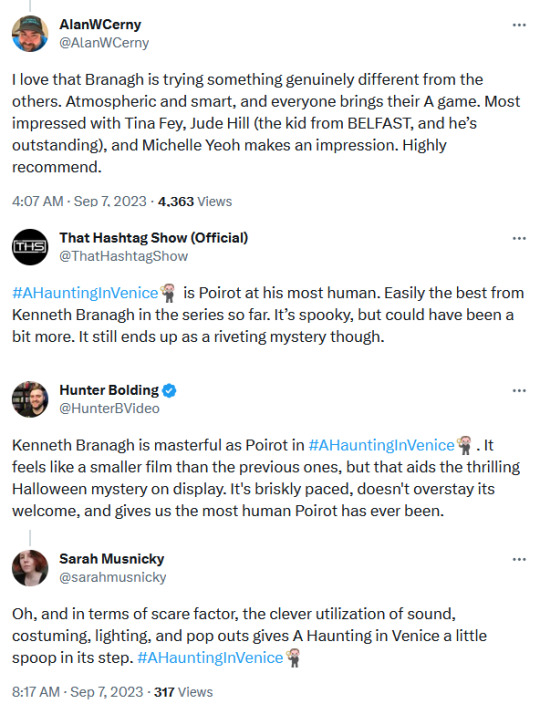


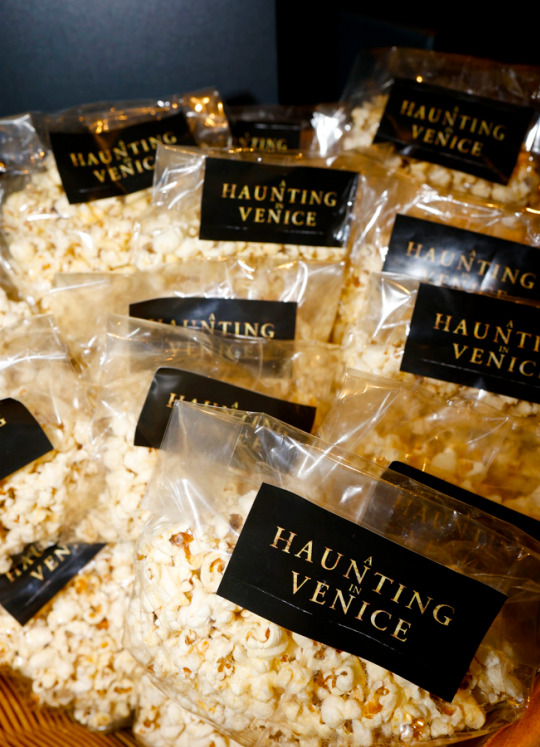
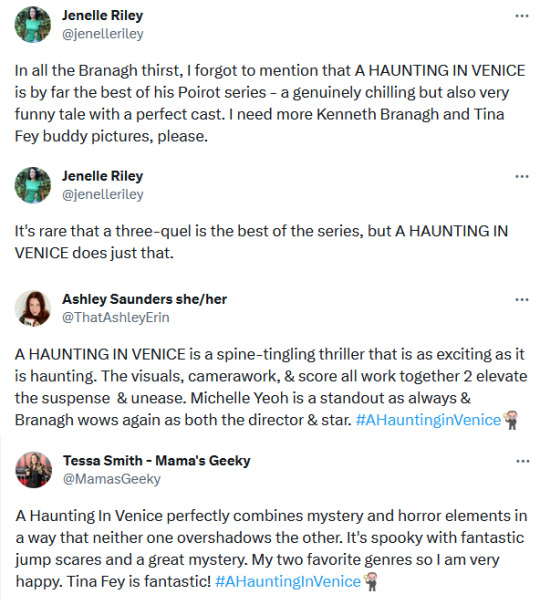
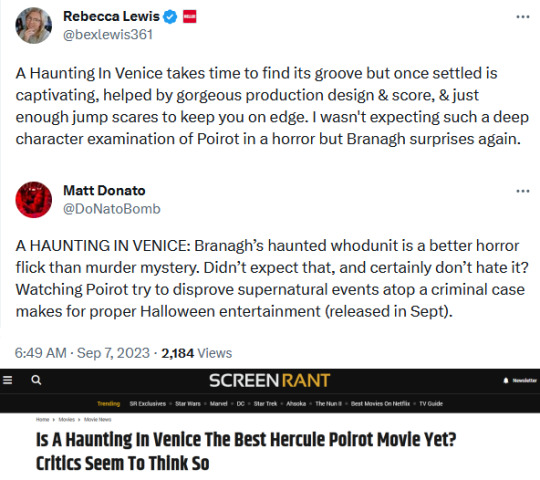

A Haunting in Venice Advanced Screening Reactions
An early screening of the movie was shown at the El Capitan Theatre in Los Angeles, California, USA, September 7 2023, to largely positive reviews.
The Hollywood Roosevelt Hotel's Blossom Room had a spooky setup, fun photo-op backdrop for selfies, masked Venetian gondoliers floating about, and the film's costumes on display!
Source (Photos): stacilaynewilson, dennis.tzeng, asadayaz, idkgravity, joerussotweets, izumihasegawa, zack.quin Instagram Stories
#a haunting in venice#poirot#hercule poirot#agatha christie#kenneth branagh#tina fey#michelle yeoh#jamie dornan#jude hill#very encouraging reactions and reviews! :)#even those who claim 1st part of film#is a bit slower (like it was in DOTN actually)#say that it's overall satisfying#and the gothic supernatural angle#is well executed as well as direction#and that the cast is the best one so far#articles say there are quite a few changes#made to the story which is a departure#from previous 2 films#studio said they felt it was safe to do so after 2 films#the general reaction is that it's a solid film#and the best one in the poirot trilogy :)#i'm very happy and excited! :)))
26 notes
·
View notes
Text

The supernatural vibe is uncharacteristic of a Hercule Poirot story, imo. But it is a Halloween themed movie afterall. And so obvious, in retrospect, how the supernatural elements came to be.
A Haunting in Venice is a 2023 American mystery film produced and directed by Kenneth Branagh from a screenplay by Michael Green, loosely based on the 1969 Agatha Christie novel Hallowe'en Party. It serves as a sequel to Death on the Nile (2022) and is the third film in which Branagh reprises his role as the Belgian detective Hercule Poirot. The ensemble cast includes Kyle Allen, Camille Cottin, Jamie Dornan, Tina Fey, Jude Hill, Ali Khan, Emma Laird, Kelly Reilly, Riccardo Scamarcio, and Michelle Yeoh.
#a haunting in venice#hallowe'en#halloween#agatha christie#mystery#whodunnit#hercule poirot#kyle allen#camille cottin#jamie dornan#tina fey#jude hill#ali khan#emma laird#kelly reilly#riccardo scamarcio#michelle yeoh#jumpscare#movie review#2023#a haunting in venice review
7 notes
·
View notes
Text
1.02 hands
the tense opening! and how the show expertly swaps the chaotic tension of the beef with the sterile tension of carmy’s restaurant in new york. but it amazes me how even on my millionth rewatch of the show, when joel mchale comes in i go “is that joel mchale? no. it can’t be”, why is jeff winger on the bear? and then he does such a scary good job.
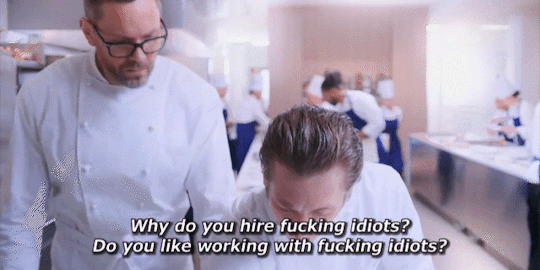
the quick cut from the quiet horror of the new york restaurant to the chaos of the beef is beautifully done, and the fact that carmy is making a burrito is so random and fitting and odd. it just works. carmy has swapped out one shitshow for another, and this one is messier, lower quality, and there’s never a quiet moment. it’s just in your face, all the time, nonstop. but THAT is the place carmy has chosen to be. worth noting.

carmy throwing out the french laundry is his first mistake of the episode. he should know better, especially after specifically not doing it last episode, than to throw out his previous jobs and education to richie, tina, or ebra. “well, go fuck your french laundry. stupid fucking name”. “alright, then at noma-“ “oh, and fuck your noma, too”.
but the back and forth conversation of carmy having noma, and the french laundry on his resume, and richie having gone to devry where they’re “serious about success”, and then the ice cream machine breaks and richie is the one to go fix it (but also by grabbing a bunch of spoons and kitchen utensils, and decidedly NOT actual tools) is on point. and without a missed beat sweeps asks “you graduated?” and richie going “fuck no!” *chefs kiss*
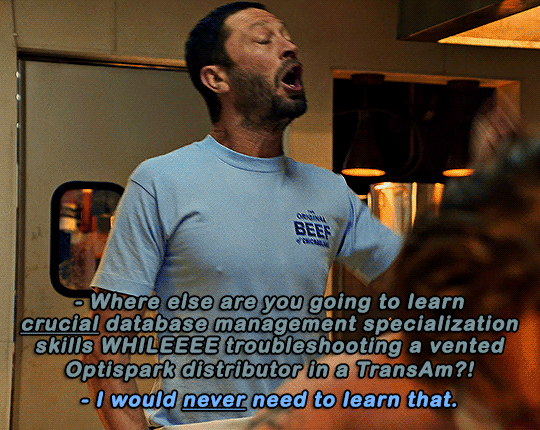
but the class dynamic at play in that scene is gorgeous. because both paths have validity and value in the beef. the ice cream machine breaks and carmy can’t fix it with chef skills. but richie has the skills to fix (or at least he can finagle his way to fixing) the machine. it’s lovely.
the slowdown we see with carmy going outside to smoke, before he goes back to cleaning is nice. the first episode is so break-neck, nonstop intense that having this pause is nice. because it would be impossible to keep up with that pace, and even if it was possible, it wouldn’t be enjoyable to watch.
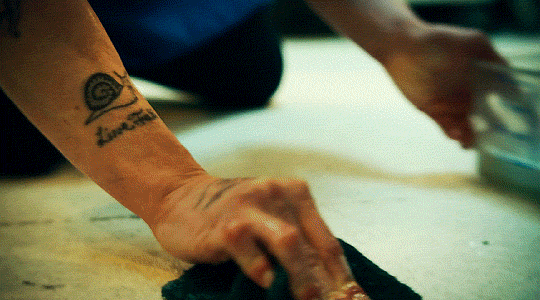
of course the peaceful and slow scene is followed up by carmy sleep-cooking and almost starting a fire in his apartment when he cooks frozen and wrapped food. it just reminds us that even when he’s away from the (chaotic and nonstop) kitchen, and we the audience get a small reprieve, the show reminds us that chaos can return at any moment.
also, in the scene of carmy at home, the quick meal of peanut butter sandwich, chips, and pop, when he works in a place of great food is so real. when i worked in food, after a long day when i’d come home and be absolutely starving, the last thing i would want to do would be make food for myself. ramen, or just a bunch of lunch meat was a regular meal of mine for YEARS.
i have a lot to say about the scene when sydney comes into carmy’s office to show him her multi-paged research project of ideas to help the bear. and i want to be careful and intentional about how i say this because i know the carmy and sydney debate and subsequent fierce support for each of them is strong and i don’t want to needlessly offend anyone.
BUT as someone who has been on both sides of that conversation, as a passionate employee who has a million ideas for how to fix all the problems of the place where i’m working, and as a manager/operator of a business who has a million things on their plate and can’t quite deal with a million more ideas flying at them (even if those ideas are good) i get it. i really get both sides. sydney is not *annoying* for bombarding carmy with this 30-something page packet of data and ideas. and carmy is not a dick for brushing it off and jumping into something else and leaving sydney in the lurch. sydney didn’t have tact with how and when she came to carmy, who is trying to deal with big picture problems, small picture problems, culture, systems, and a million other issues. sometimes as management you just can’t process anymore. but likewise, carmy could have done a better job of telling sydney that he needed time to process and couldn’t engage in that conversation in that moment. the real issue was a lack of communication, and a misunderstanding of how the other operates. which is something that i think is built upon in season two. i’ve seen so many people defend only carmy, or only sydney. but i think both have their faults in this scene.
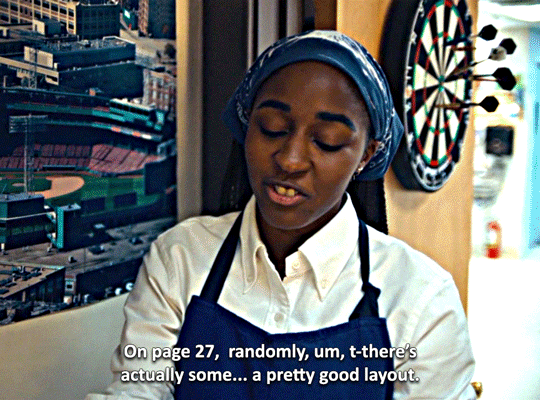
you could also argue, however, that carmy as the person in charge with the privilege of ownership, should have done more with his power to communicate what he needed. he’s the example setter for the business and didn’t do a good job showcasing what he needed in the moment.
(also, peep the beginning of the season-long storyline arc: to-go orders and the battle of sleeping on making money from to-gos, and the struggle of figuring out how to manage starting a to-go program)
it’s odd that carmy leaves his office (and sydney) because richie calls out to him “yo, carm!” but then when carmy comes out to see what’s happening richie is the one who says “i can handle this myself cousin. i got this.” like…was that a continuity mistake on the editors/directors part? am i missing something? why draw attention to the issue, and then when the person who’s attention you drew gives you their attention you go, “i don’t want your attention”?
“ron’s gone. gone gone.” “ron’s dead!?” is so funny. i don’t understand people who argue this isn’t a comedy.
the actor who plays nancy chore, chicago board health inspector, is a chicago staple. and i always forget her name.
the biggest thing i have experienced in the service industry when it comes to health inspectors is that if you take richie’s attitude towards them: combative, mistrusting, aggravating; they’re going to suspect you have shit to hide. if you take carmy’s attitude: polite, welcoming, say something along the lines of “feel free to look around, ask me anything if you need me” they’re not going to be as suspicious. don’t fuck with health inspectors…they will fuck back.
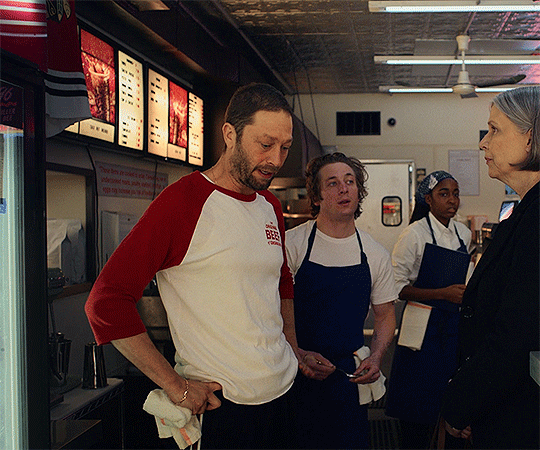
ebra and tina taking a smoke break but ebra smoking a BIG ASS cigar, is ICONIC. plus the fact he doesn’t say anything as tina complains to him….we need more ebra. he deserves a spin off. he deserves a movie. i’m in love with ebra.
sydney going right back in with talking to carmy is kind of what i’m talking about. sydney isn’t reading the room and trying to be courteous of where carmy is at. they work in a shithole and a health inspector just came in. carmy probably needs to focus on that, and not on your 30-pages of ideas. however, while carmy is a little blunt, i think he does a decent job of telling sydney that what she’s giving him is a lot with everything else he’s dealing with. highlighted by the immediate shouting of richie…again.
is richie being the one to interrupt sydney and carmy’s conversations about fixing up the beef symbolic? maybe? idk. just a thought.
it’s amazing to me (and again, i know chicago is special and a world unto itself) that a restaurant can have a hole in the tile, with a former gas line next to the stovetops not properly dry-walled and caulked, but clogged with napkins, meaning cross contamination, no hot water in the hand station, AND a pack of cigarettes ontop of the stovetops by the burners and it ONLY results in a C grading? damn.

major props to sydney for getting in between carmy and richie as they get in each others face, ready to beat each other up. that’s some chicago badass behavior right there on her part and i think that’s the moment i fell in love with her.
“you cocked it up, you’re gonna caulk it out” is such an ingenious line and i wish i could have been in the writers room when they came up with that one. same with “surge rates, fucko!” the gold standard of lines.
sydney and richie in his car is just, once again, a chefs kiss of a scene. richie telling sydney she has to wiggle the gear shift, sydney asking richie to hold her purse while she gets ready to drive and him dutifully putting it at his feet. but there’s an automatic nature to how richie does it, that while it may have been ebon moss-bachrach just doing it, i really believe it was an acting choice to show that richie definitely had a wife, before we even see the phone call between him and his ex-wife.
the comment about the multiple arby’s cups being from different visits. god, i love it.
BUT THE MOST BEAUTIFUL detail is the song choice that starts up when the car starts: have you seen me lately, by the counting crows. but not just that, but the live acoustic version. this is a deep cut that ABSOLUTELY was not chosen randomly, but was chosen with precision simply because it’s a song you listen to only when in the depths of despair. richie driving to work and listening to that song is a sign of his internal torment like nothing else we see this season.
richie calling carmy “carmine” is odd. since we know carmy is short for carmen. everyone always says carmen. this is the one instance we hear carmine. is carmen short for carmine, and i’m not aware of it? was it a character choice to say carmine in this instance? was it a mistake that was left in? i wanna know.
gotta respect sydney (for a multitude of reasons, as i’ve said and as i’ll continue to say) that while richie is ranting about how angry he is at carmy, and how stupid carmy is, she says “what does that have to do with what we’re doing? we’re trying to fix the wall. which you fucked up before carmy was even at the restaurant.” like trying to use some therapy 101 of “hmmm…what you’re saying has nothing to do with what’s happening. so, you probably have some deeper issues at play here that you should probably address and work through on your own time.”
ope, uncle jimmy cicero coming in hot with a plot twist of mikey owing jimmy 300 grand. but also, the quick comment of jimmy saying that mikey was “an animal”, which comes into play in season two. a lot of thought went into this show, and you can tell with just every second while watching it.
“i should have stopped by to break your legs”…i would just love to know more about uncle jimmy. i mean obviously he is a prime example of “less is more” with storytelling. we know he’s rich, we know he’s older but has a younger wife and kid (who we’ll meet later), and we also know he makes comments and has conversations around giving people jobs under the table. we can fill in the blanks that he has mob connections, or a criminal network, or something along those lines but we never know exactly what it is upfront. we also don’t know what his day job is. and while i always want more, i love that we’re allowed to just sort of wonder. plus, don’t we all have that relative that we grow up and learn more about and go “ohhhhh. that’s suspicious.”
sydney also trying to come in hot with throwing out some of carmy’s accomplishments to richie, who without surprise still doesn’t give a shit. class struggle right here.
ok. so. the phone call richie gets in the car. this is a master class of storytelling. from the writing to the acting, to the way it was shot. we see richie, being driven around to fix a mistake he made out of his own incompetence. he’s being talked down to by people with skill and talent, of which he seemingly has none. he’s being so obstinate and thick and grating on the audience. and then he gets this call and he picks it up and we see his dirt-caked fingernails, and the distinct shine of his golden wedding ring still on his finger. and we see his pain, and his frustration as he talks to his ex-wife, with these absolutely open and innocent and brilliant blue eyes that softens the hard edges we’ve come to know from him. and then we see that softness actually come out as he talks to his daughter with this mix of pain and heartbreak as it’s so clear she’s his favorite thing in the world, but she asks him if he really loves her. you suddenly know exactly what he’s dealing with outside the restaurant; an ex-wife who is poisoning his daughter against him, even though he clearly isn’t the best example of a stable father and you think his ex probably has a point, and that eats him up because he so clearly wants to be a good dad. and in season two we see how much he wanted to be a good dad. but we’ve also seen so many examples of how he’s not the best example for his daughter. and that all of this happens with sydney right next to him (the worst person in the world to be right next to him). plus he caps it off by saying he fucked up by getting the wrong caulk, AND messed up by leaving his cigarettes on the burner! more on that later. but all of it absolutely makes your heart ACHE for richie, and if it doesn’t you’re a monster. it’s because of the time and care for scenes like this with richie that there is a whole subsection of people who are OBSESSED with richie and love him. despite him being sexist and homophobic.
also, richie calling his 5 year old daughters classmates a bunch of “fuck faces” is an example of ruthless and honest parenting that i am coming to understand more and more each day since my son was born. other kids ARE fuck faces, but my kid is fucking incredible.
i love that we see carmy reading syd’s packet. because it shows he does want to read it. he wasn’t dismissing her for his own egotistical desire to fix everything himself. he truly needed to wait for a moment when he could process everything she was saying, and that moment wasn’t the moment sydney came into his office to talk to him unannounced, but it was later on in the day
oh, pete. i feel like every family has a pete. that person who you know treats your family member well, and loves them, and you know they’re basically a good person…but they just don’t click with the vibe of your family. they’re a little bit too square. they’re off. it’s just too easy to make fun of them. it’s so painfully funny, and honest, and UGH the short conversation between pete and carmy on the phone. pete’s doing nothing wrong and you just wanna be like “pete….shhhhhhhhh.”
it does take real acting skill to have a scene where carmy says “i wanted to apologize for last time…” and pete says “no problem! i went to urgent care and they gave me some stuff to put on it.” and without even knowing the specifics or the context you’re left going “yeah, but pete probably deserved it?” pete is that good at being a loveable schmuck.
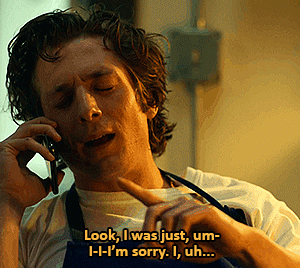
carmy admitting to natalie that he sleep walked and almost set fire to his apartment is so good at showing that nat has gone to therapy. and that carmy desperately needs to go as well.
nata saying “shut the fuck up” to carmy, and then pete from another room saying “you want me to shut the fuck up?” to which nat responds “not you, sweetie. you didn’t say anything.” is SO GOOD
“i was throwing up everyday before work” “oh. well that sounds chill” “i kinda dug it.” - a low key theme shown throughout the first season that carmy has an unhealthy attachment to his own pain and suffering (more on that as it happens in the show)
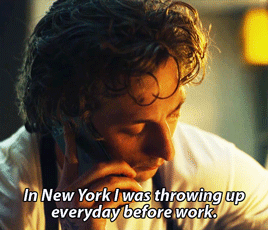
the way that the bear could have been just another show of any infinite number of shows about a fucked up protagonist who’s driving narrative could be resolved if the main character just went to therapy, but never does, because instead the bear says “yeah! carmy needs therapy!” this show is so pro therapy, and i’m excited for more of it as the show progresses in future seasons!
AHHHH richie found a note! addressed to carmy! from mikey! i forget that this episode really sets up the rest of the season! the first episode introduces us to the show, but this episode introduces us to the seasons! there are so many points that we’ll keep coming back to as the show progresses.
also, ebon moss-bachrach committing to, and executing near perfectly, the thick inside chicago accent (as illustrated by his “yeah yeah yeah, i’ll be right dere”) is perfect. i know some people say his accent is borderline offensive as a stereotype, like the accents used in fargo was for minnesotans. but much like the accents from fargo, while not everyone in illinois has richie’s accent, SOME people do. and his use of it is 🤌🤌🤌.
so sydney is on the line, calling out orders as ebra repeats the orders back to her while calling her “chef”. this shows that ebra is now getting on board with the new system, as opposed to mikey’s old system. i only wish we would have seen the transition of ebra accepting this new system. or maybe the point is that ebra is go-with-the-flow enough that as long as he gets to work with his beef, he’s happy.
BUT sydney at the front calling out orders is something we see started in the next episode, where carmy has formally implemented a french brigade system in the kitchen and placed sydney as his sou chef. so why is sydney already acting as his sou in this scene? was this scene shot and intended for a future episode and was cut and moved to fill a hole in this episode? once again, am i missing something? it seems like sydney is doing the thing she’s promoted to do in the next episode, in this episode. except that in the same scene carmy says “thank you for taking richie today”, which could only be talking about sydney taking richie to get caulk right?
richie and carmy talking about how jimmy is getting the health department to come back, despite the health inspector saying she can’t legally come back for 30 days, and just chalking it up to jimmy being jimmy. *another chefs kiss*. i want to know more about jimmy but his beauty is his mystery.
it’s really good storytelling that richie sees the cigarettes on the burner and assumes they’re his. and that everyone assumes they’re his. even though richie, carmy, and tina smoke cigarettes. but it can’t be carmy because he’s the professional, young, hot shot, classical and fine dining trained chef. on top of that, we have this whole episode where you could get the vibe that maybe carmy is ignoring sydney’s suggestions because carmy wants to do it himself, he wants to save the restaurant himself. but then we have a scene where carmy is looking at syd’s packet, before nat tells carm that he might need help, and then carmy hires sydney officially at the restaurant, subtly telling her he’s going to implement some of her ideas. because he said he couldn’t afford to hire her for real, but now he can. carmy is admitting to sydney that he needs her help. and right as he admits to us the audience that he needs help, we realize that it was him who left his cigarette on the burner. he was busy cleaning the restaurant by himself, trying to save and care for it by himself, and he absentmindedly put them on the burner and kept on cleaning. so now we, the audience, really know: carmy, most definitely, needs help. because his talent, his skill, his training, and his schooling aren’t enough to save this restaurant. he needs syd’s passion, and he needs richie hobbling things together cheaply. he can’t do it alone.

and realizing that he really, really needs help leads him to look at nat’s text again: where she’s sent him a link to al-anon. the closest thing to therapy he’s gonna get this season.
Season One: Episode 1 | Episode 3 | Episode 4 | Episode 5 | Episode 6 | Episode 7 | Episode 8
#the bear#the bear fx#the bear hulu#carmy berzatto#carmen berzatto#tina the bear#the bear series#the bear spoilers#marcus the bear#the bear tv#the bear review#the bear season 1#richie the bear#the bear richie#carmy the bear#carmy#sydney#sydney the bear#sydney adamu
50 notes
·
View notes